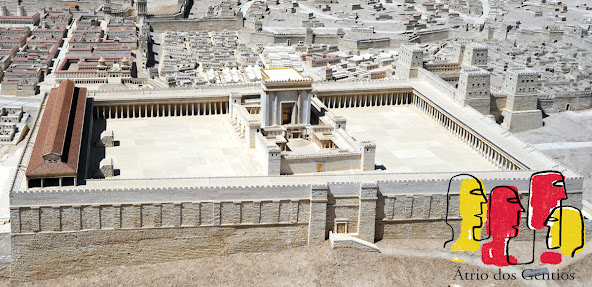The Vatican has created a space for dialogue between believers and non-believers called the "Courtyard of the Gentiles". This name evokes the only place in the Temple of Jerusalem that could be frequented by non-Jews. It was, in fact, the place where sacrificial animals were bought and sold.
The Jerusalem Temple was divided into courtyards, which consisted of concentric rectangles, arranged according to "Sacredness" level: from the least sacred, the Courtyard of the Gentiles open to everyone, to the most sacred, the Sancta Sanctorum. Following this scale, the first would be open to anyone, the second to Jews only, the third to men, the fourth to priests, and the fifth, the "Holy of Holies", only to the High Priest.
Specifically, the dialogue between believers and non-believers, which took place in Guimarães and Braga on November 16 and 17, filled me with confidence; however, designating it the “Courtyard of the Gentiles" certainly makes sense in historical and metaphorical terms, but it is not immune to the possibility of a certain pejorative connotation.
"Gentiles" was the derogatory term the Jews gave to non-Jews, and there were even Pharisees who vehemently believed that God created the Gentiles to feed the fires of hell (where the "bad" Jews would also end up). From this point of view, I believe that, in this day and age, calling "non-believers" "Gentiles" is like calling them "Infidels", the term the Muslims give to all those who do not profess their faith.
When we were little, if there was one thing we hated the most, it was being called names; we should avoid the temptation to call others names based on our worldview – that is, the way we see and are in the world. For this very reason, the Inuit of Northern Canada do not like to be called Eskimos; that is the name we give to them, not the name they identify with. I doubt that non-believers in general, or those who simply do not profess our faith, like to be called "Gentiles".
On this mountain, the Lord of hosts will make for all peoples a feast of rich food, a feast of well-matured wines… Isaiah 25:6
If I had to find in the Old Testament a metaphorical term for this space of dialogue between men and women of good will, I would call it the Banquet of Isaiah. Isaiah is, without a doubt, the least nationalistic and the most universalist prophet of Judaism, an authentic "Christian" avant la letre.
Fr. Jorge Amaro, IMC


No comments:
Post a Comment